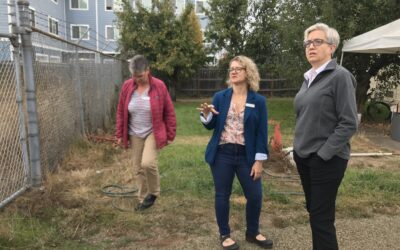Frequently Asked Questions
What is Housing First?
According to the National Alliance to End Homelessness, Housing First is an approach to ending homelessness that centers on providing people experiencing homelessness with housing as quickly as possible – and then providing services as needed. This approach has the benefit of being consistent with what most people experiencing homelessness want and seek help to achieve.
Housing First programs share critical elements:
- A focus on helping individuals and families access and sustain permanent rental housing as quickly as possible without time limits;
- A variety of services delivered to promote housing stability and individual well-being on an as-needed basis;
- A standard lease agreement to housing – as opposed to mandated therapy or services compliance.
Housing is a basic human right, not a reward for clinical success. Once homelessness is eliminated from a person’s life, clinical and social stabilization occur faster and is more enduring.
Seven standards of the Housing First approach:
- Move people into housing directly from streets and shelters without preconditions of treatment acceptance or compliance.
- Provider is obligated to bring robust support services to the housing. These services are predicated on assertive engagement, not coercion.
- Continued tenancy is not dependent on participation in services.
- Units targeted to most disabled and vulnerable homeless members of the community.
- Embrace a harm reduction approach to addictions rather than mandating abstinence. At the same time, the provider must be prepared to support resident commitments to recovery.
- Residents must have leases and tenant protections under the law.
- Can be implemented as either a project-based or scattered site model.
How is Housing First supported housing going to improve the lives of the homeless?
When people move into housing, they are provided an opportunity for greater stability which can help set the stage for addressing mental health, substance abuse, and physical health issues. However, for some, housing without support will quickly lead to a repeat experience of homelessness. People who have experienced chronic homelessness, or incidents of homelessness lasting more than a year, or multiple incidents of homelessness while being disabled in some way experience a great amount of trauma and have ongoing difficulties with health issues. According to the US Interagency Council on Homelessness, study after study has shown that supportive housing not only resolves homelessness and increases housing stability, but also improves health and lowers public costs by reducing the use of publicly-funded crisis services, including shelters, hospitals, psychiatric centers, jails, and prisons.
How is CHF planning to end homelessness and get more people in permanent housing?
We believe that people experiencing chronic homelessness benefit the most from low-barrier shelter and housing without preconditions on sobriety or involvement in treatment for physical and mental health issues. We work to establish relationships with these individuals in our community through outreach work on the street and in shelters to help facilitate them moving into housing. Once placed in CHF housing, residents can participate in case management where they work with our staff to set goals and get help. The first step after housing is stabilization of health, behavior, and connection with physical and mental health resources, social service resources, and case management. Residents in housing work with a property management company who manages all CHF housing, sign a lease, and have the same rights as any other tenant, following Federal Fair Housing rules and and Oregon rental property laws. Our staff work with residents to help them be successful and stable in housing so that they can move on to other independent permanent housing or or stay in our housing, depending on their needs.
We are exploring partnerships with other landlords and organizations to create more supported housing units, as well as establishing more supported housing ourselves.
How are you going to handle those with serious drug and alcohol addictions?
We operate behavior-based housing, so people can stay in housing if they follow rules of behavior. We provide case management for each individual coming into our services. We know that for many who have long-standing issues with addiction (as well as chronic mental health and physical health issues), the path to sobriety and recovery is likely going to be difficult, and may never happen. However, we offer support for sobriety and treatment including making referrals and facilitating transportation to detox facilities and substance abuse programs, as well as mental and physical health services. We assist people obtaining health and social service benefits. We encourage participation in alcohol and drug programs through Benton County Health Department, Milestones, and local 12-step groups.
Do you have rules at your housing? Is the housing staffed 24-7?
Because residency at our properties is behavior-based, we do have rules residents must follow as well as lease agreements. We provide ongoing training to residents on hot to comply with these rules. While we do not require residents to be sober, we do not allow consumption of alcohol or illegal drugs in common areas. Marijuana and nicotine products must be smoked in the common smoking areas at each site. We have paid staff at all times when housing is occupied who are physically on-site or available on an on-call basis 24-7, 365 days a year. We also utilize security cameras in multiple locations to help ensure the protection of residents as well as the community. We work very closely with local law-enforcement and crisis services, and do not hesitate to call them for questionable behaviors.
What does Case Management look like at CHF?
We provide residents with a holistic, professional, individualized approach to case management that is assertive (meaning we often initiate conversations and interaction, and use motivational interviewing and other tools to help move people toward their goals), flexible but consistent, trauma-informed, and asset-based. We can help residents with everything from enrolling in college classes to applying for SSI/SSDI support, to finding and advocating for appropriate mental health services, to being a support during medical procedures, and beyond. For many residents, their case manager takes the place of a supportive friend or relative until they are able to establish positive, supportive relationships on their own. Successfully working with clients takes skill, a great deal of self-awareness, respect of the individual, and compassion with boundaries.
Frequently Asked Questions about Third Street Commons
Tina Kotek visits Corvallis to support a possible solution to homelessness
CORVALLIS, Ore. — Ballots are out, voters can decide, and candidates are making their final pitches. Democratic candidate for Oregon Governor, Tina Kotek, says her goal over the final two and a half weeks is to talk to every voter possible about solutions for Oregon's...
Third Street Commons – FAQ’s 10-13-22
Where is Third Street Commons Located? The Third Street Commons is located on 99W just south of Avery Park in Southtown. It has 24 rooms are being used for shelter/housing and a 3-bedroom house that is the new organizational headquarters for Corvallis Housing First...


